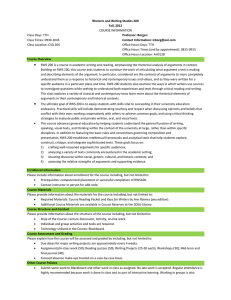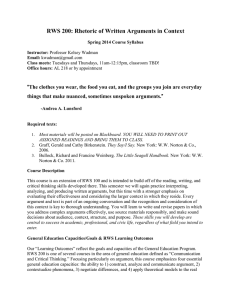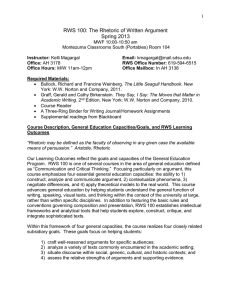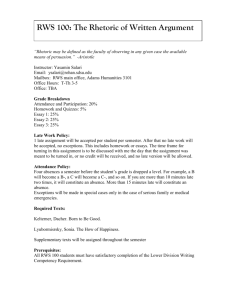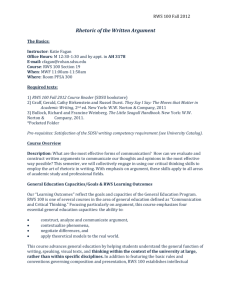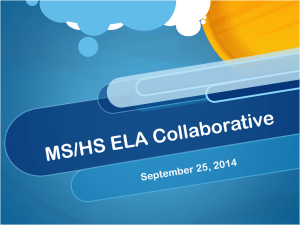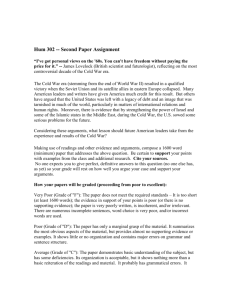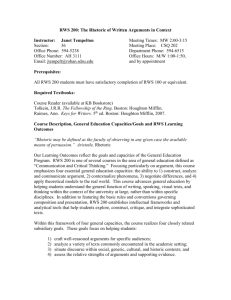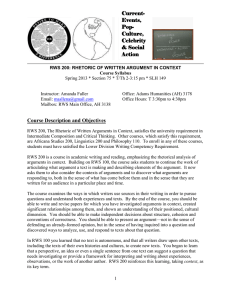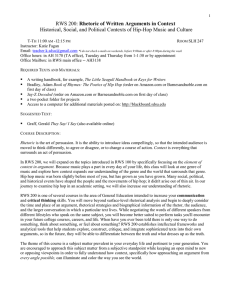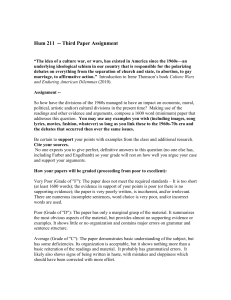RWS 100: The Rhetoric of Written Argument
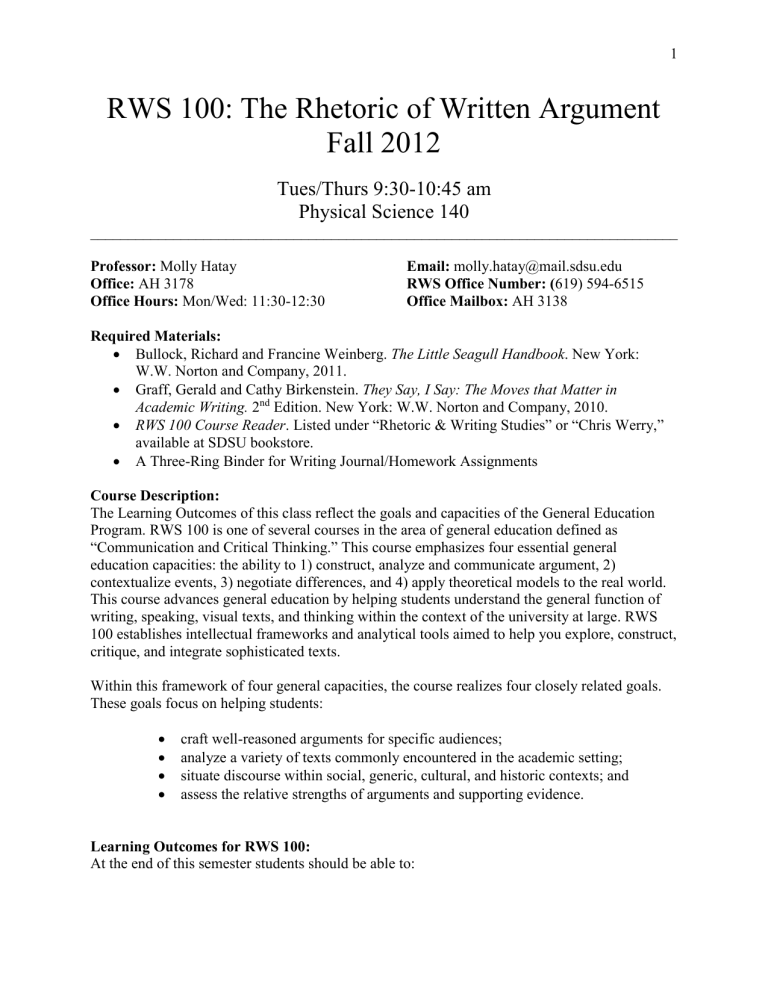
1
RWS 100: The Rhetoric of Written Argument
Fall 2012
Tues/Thurs 9:30-10:45 am
Physical Science 140
______________________________________________________________________________
Professor: Molly Hatay Email: molly.hatay@mail.sdsu.edu
Office: AH 3178
Office Hours: Mon/Wed: 11:30-12:30
RWS Office Number: ( 619) 594-6515
Office Mailbox: AH 3138
Required Materials:
Bullock, Richard and Francine Weinberg. The Little Seagull Handbook . New York:
W.W. Norton and Company, 2011.
Graff, Gerald and Cathy Birkenstein. They Say, I Say: The Moves that Matter in
Academic Writing.
2 nd
Edition. New York: W.W. Norton and Company, 2010.
RWS 100 Course Reader . Listed under “Rhetoric & Writing Studies” or “Chris Werry,” available at SDSU bookstore.
A Three-Ring Binder for Writing Journal/Homework Assignments
Course Description:
The Learning Outcomes of this class reflect the goals and capacities of the General Education
Program. RWS 100 is one of several courses in the area of general education defined as
“Communication and Critical Thinking.” This course emphasizes four essential general education capacities: the ability to 1) construct, analyze and communicate argument, 2) contextualize events, 3) negotiate differences, and 4) apply theoretical models to the real world.
This course advances general education by helping students understand the general function of writing, speaking, visual texts, and thinking within the context of the university at large. RWS
100 establishes intellectual frameworks and analytical tools aimed to help you explore, construct, critique, and integrate sophisticated texts.
Within this framework of four general capacities, the course realizes four closely related goals.
These goals focus on helping students:
craft well-reasoned arguments for specific audiences;
analyze a variety of texts commonly encountered in the academic setting;
situate discourse within social, generic, cultural, and historic contexts; and
assess the relative strengths of arguments and supporting evidence.
Learning Outcomes for RWS 100:
At the end of this semester students should be able to:
2
Describe elements of an argument—claims, methods of development, kinds of evidence, persuasive appeals; annotate the work that is done by each section of a written argument;
Use all aspects of the writing process—including prewriting, drafting, revising, editing, and proofreading;
Choose effective structures for their writing, acknowledging that different purposes, contexts and audiences call for different structures; understand the relationship between a text’s ideas and its structure;
Identify devices an author has used to create cohesion or to carry the reader through the text; use metadiscourse to signal the project of the paper, and guide a reader from one idea to the next in their writing;
Effectively select material from written arguments, contextualize it, and comment on it in their writing;
Determine when and where a source was published, who wrote it and whether it was reprinted or edited; understand that texts are written in and respond to particular contexts, communities or cultures; examine the vocabulary choices a writer makes and how they are related to context, community or culture, audience or purpose;
Respond in writing to ideas drawn from various cultures and disciplines, using the activity of writing to clarify and improve their understanding of an argument;
Analyze and assess the relative strengths of arguments and supporting evidence;
Analyze and assess arguments made by visual texts; incorporate visual images into their documents;
Craft well reasoned arguments for specific audiences;
Edit their writing for the grammar and usage conventions appropriate to each writing situation;
Assign significance to the arguments that they read;
Reflect on how they wrote their papers, and revise arguments and findings based on critical reflection.
Readings
– Throughout the semester, we will be reading, analyzing, and discussing selections from the Course Reader as well as additional texts distributed in class or available online.
Successful students will:
Have the text read before the class period it is due,
Bring the Course Reader and any required reading to class,
Read and annotate each text carefully so that you are prepared to participate in class discussions based on the reading.
Writing – You will complete three main projects over the course of the semester. Each project is carefully designed to help you develop mastery of the learning outcomes listed above. These writing projects will be between 4-6 pages in length, and I will give you a more detailed written description of each assignment and my expectation well before each project is due.
3
The final project will ask you to reflect on your work in this class, your progress and development, and future goals. I will give you plenty of information about my expectations for this project well before the project is due.
Classroom Policies:
Participation/Attendance: There is no substitute for attending class. This is a discussion-oriented course, and your attendance is mandatory. Students are allowed no more than 3 absences during the semester. Missing more than 3 classes will result in a reduction in the class attendance/participation grade. Participation does not mean you need to make a meaningful contribution to class discussion every class session, but it does mean that you do need to make an effort to join the conversation, pay attention, and contribute ideas in group work.
Daily Journals and Quizzes: The first 10-15 minutes of class will be devoted to either responding to journal question designed to help you begin thinking about the topics central to this class. If you come to class late and miss the journal or quiz, you may not make it up, so be sure to be on time. I will periodically collect these journals and grade them to check in with you and see what you are thinking. These journals are a good way to develop your ideas, and I will grade them fairly easily. I want to reward your thinking.
At certain points in the semester I will quiz you on your understanding of readings done as homework. These quizzes will be announced the class before they will be adminstered, and they are not intended to trick you. Their purpose is to motivate you to keep up with the reading for this class and encourage you to read carefully.
Late Assignments: I do not accept late work. If you have an extenuating circumstance, you are welcome to discuss it with me before the assignment is due, and perhaps we can work something out. If you need to miss class on a day an assignment is due, you may turn in an assignment early to my mailbox.
Re-Writes: Students may choose to re-write ONE essay after receiving a grade for the assignment. Your original grade and re-write will be averaged for a new grade. Re-writes will be due one week after they are handed back to you. I will only accept a rewrite if you visit me in my office hours and bring your original paper with you.
Blackboard: We will be using Blackboard for various assignments and announcements throughout the semester . You will also be required to turn your papers in through Turnitin and to bring me a hard copy. If you strongly object to this, you may write me a two page description of your reasons for opting out. Please check Blackboard regularly.
Respect: As this is a heavily discussion and group work based class, I expect you to treat your peers with respect even if you do not agree. Before you speak in class, make sure to remember that we, as a class, form a diverse group embodying many different identities and ideologies and that you will be working closely with your peers and do not wish to alienate anyone. If I feel you are being disrespectful to another student, I may take away participation points as being disrespectful limits the class’s ability to have quality discussions. (If you have managed to read
4 to this point, send me an e-mail telling me what your favorite sports team is, and I will give you
2 extra credit points. What a wonderful way to begin the semester.)
Cell Phones: It is extremely disrespectful to text, check the time, or play games on your phone during class time. All cell phones should be silenced for the duration of this class. Using your cell phone in class communicates to me that you are not participating, and I will dock your participation grade as I see fit. You may, of course, step outside to take care of any emergency calls.
Laptops and Tablets: You may use a laptop computer or tablet in class only if you can provide evidence from Student Disability Services that it is a necessity. Students who may use laptop computers must sit in the back of the class, so as not to distract their peers
Workshops: You will be working in groups with other students during class activities as well as in editing workshops. When we have a peer editing workshop, you need to bring one copy of your paper for every group member.
Plagiarism : All work in this course must be original; academic integrity is expected at all times.
Plagiarism in any class will result in serious consequences ranging from grade reduction to failure in the class to expulsion from the college. The university catalog describes plagiarism as follows:
Plagiarism is formal work publicly misrepresented as original; it is any activity wherein one person knowingly, directly, and for lucre, status, recognition, or any public gain resorts to the published or unpublished work of another in order to represent it as one’s own. Work shall be deemed plagiarism: (1) when prior work of another has been demonstrated as the accessible source; (2) when substantial or material parts of the source have been literally or evasively appropriated (substance denoting quantity; matter denoting qualitative format or style); and (3) when the work lacks sufficient or unequivocal citation so as to indicate or imply that the work was neither a copy nor an imitation. This definition comprises oral, written, and crafted pieces. In short, if one purports to present an original piece but copies ideas word for word or by paraphrase, those ideas should be duly noted. (from SDSU General Catalog 2009-2010 . San Diego
State University, 2009: 455)
For more information on the university cheating and plagiarism policy, please visit: http://wwwrohan.sdsu.edu/dept/senate/ policy/pfacademics.html.
Tutoring: One-on-one tutoring is a wonderful way to get some expert help if you find that you are struggling. These tutors all specialize in rhetoric and should be able to answer your questions.
Drop in RWS tutors are available in the library.
Grading
Letter Grade
A
A-
B+
Percentile Letter Grade
93-100% C
90-92%
87-89%
C-
D+
Percentile
73-76%
70-72%
67-69%
5
B
B-
C+
Grade Weights
Attendance/Participation
Project One
83-86%
80-82%
77-79%
D
D-
F
63-66%
60-62%
0-59%
Project Two
Project Three
Final
Quizzes
15%
20%
20%
20%
5%
10%
Journals 10%
Statement of Agreement
I, _____________________________, have read and understood the contents of this syllabus, and I agree to policies it details.
X____________________________
Statement of Agreement
I, _____________________________, have read and understood the contents of this syllabus, and I agree to policies it details.
X____________________________
